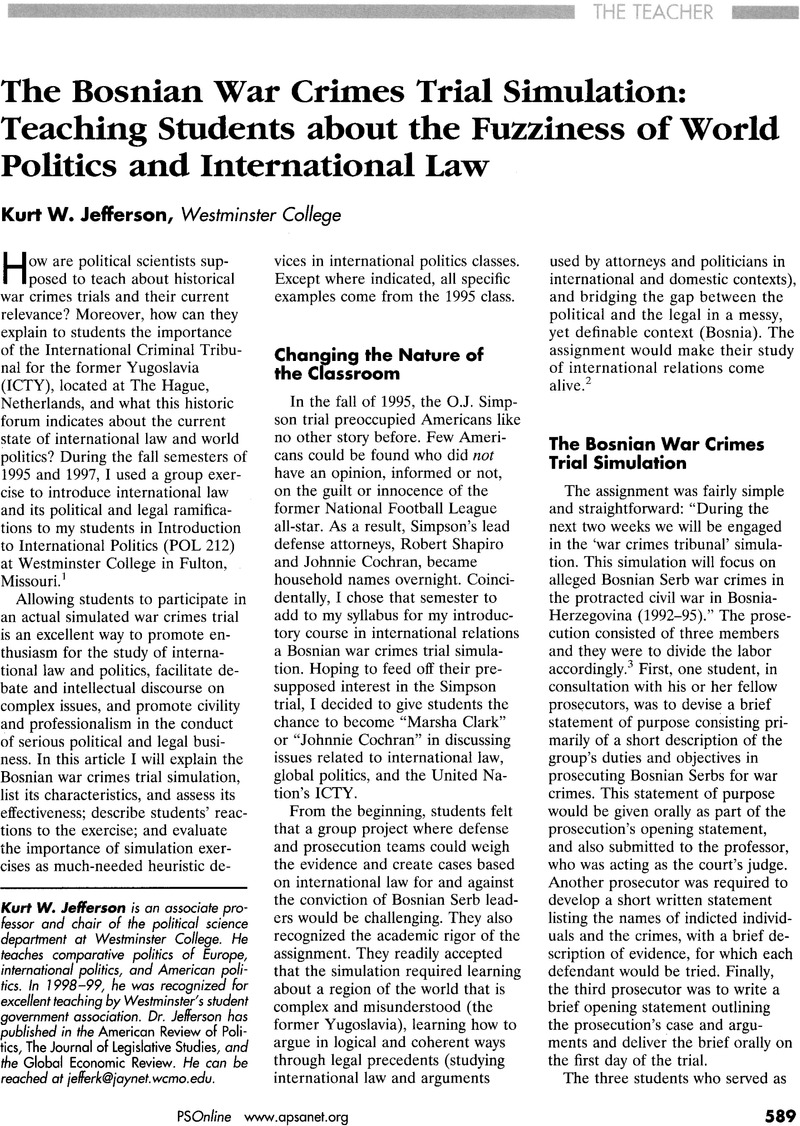Crossref Citations
This article has been cited by the following publications. This list is generated based on data provided by Crossref.
Stover, William James
2005.
Teaching and Learning Empathy: An Interactive, Online Diplomatic Simulation of Middle East Conflict.
Journal of Political Science Education,
Vol. 1,
Issue. 2,
p.
207.
KRAIN, MATTHEW
and
LANTIS, JEFFREY S.
2006.
Building Knowledge? Evaluating the Effectiveness of the Global Problems Summit Simulation.
International Studies Perspectives,
Vol. 7,
Issue. 4,
p.
395.
STOVER, WILLIAM JAMES
2007.
Simulating the Cuban Missile Crisis: Crossing Time and Space in Virtual Reality.
International Studies Perspectives,
Vol. 8,
Issue. 1,
p.
111.
Goertzen, Brent J.
and
Rackaway, Chapman
2007.
Social Security: A Pending Crisis A Leadership and Politics Debate.
Journal of Leadership Education,
Vol. 6,
Issue. 1,
p.
226.
Rackaway, Chapman
and
Goertzen, Brent J.
2008.
Debating the Future: A Social Security Political Leadership Simulation.
Journal of Political Science Education,
Vol. 4,
Issue. 3,
p.
330.
Mendeloff, David
and
Shaw, Carolyn
2009.
Connecting Students Internationally to Explore Postconflict Peacebuilding: An American–Canadian Collaboration.
Journal of Political Science Education,
Vol. 5,
Issue. 1,
p.
27.
Sands, Eric C.
and
Shelton, Allison
2010.
Learning by Doing: A Simulation for Teaching How Congress Works.
PS: Political Science & Politics,
Vol. 43,
Issue. 1,
p.
133.
Levintova, Ekaterina
Johnson, Terri
Scheberle, Denise
and
Vonck, Kevin
2011.
Global Citizens Are Made, Not Born: Multiclass Role-Playing Simulation of Global Decision Making.
Journal of Political Science Education,
Vol. 7,
Issue. 3,
p.
245.
Rothman, Steven B.
2012.
Developing and Adapting Simulations through Six points of Variance: An Example of Teaching Applied Game Theory through International Negotiations.
International Studies Perspectives,
Vol. 13,
Issue. 4,
p.
437.
Frombgen, Elizabeth
Babalola, David
Beye, Aaron
Boyce, Stacey
Flint, Toby
Mancini, Lucia
and
Van Eaton, Katie
2013.
Giving Up Control in the Classroom: Having Students Create and Carry Out Simulations in IR Courses.
PS: Political Science & Politics,
Vol. 46,
Issue. 02,
p.
395.
Niven, David
2013.
‘Passing a Law is Harder than Organic Chemistry’: Measuring What Was Learned in a Congressional Simulation.
SSRN Electronic Journal,
Bridge, David
and
Radford, Simon
2013.
Teaching Diplomacy by Other Means: Using an Outside-of-Class Simulation to Teach International Relations Theory.
SSRN Electronic Journal,
Mathews, A. Lanethea
and
LaTronica-Herb, Alexandra
2013.
Using Blackboard to Increase Student Learning and Assessment Outcomes in a Congressional Simulation.
Journal of Political Science Education,
Vol. 9,
Issue. 2,
p.
168.
Saiya, Nilay
2016.
TheStatecraftSimulation and Foreign Policy Attitudes Among Undergraduate Students.
Journal of Political Science Education,
Vol. 12,
Issue. 1,
p.
58.
Kensicki, Anna Evelyn
Harlow, John
Akhilandeswari, Janani
Peacock, Sean
Cohen, Jedd
Weissman, Ross
and
Gordon, Eric
2022.
Exploring the Impacts of Educational Simulations on The Development of 21st Century Skills and Sense of Self-Efficacy.
Journal of Political Science Education,
Vol. 18,
Issue. 4,
p.
635.
Speca, Anthony
2023.
Model Arctic Council for sustainable development.
Polar Geography,
Vol. 46,
Issue. 1,
p.
41.



